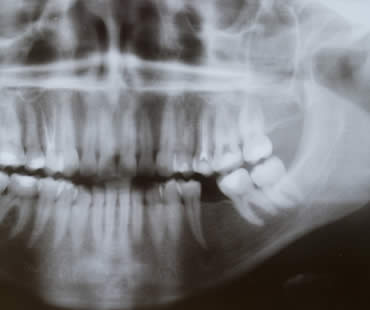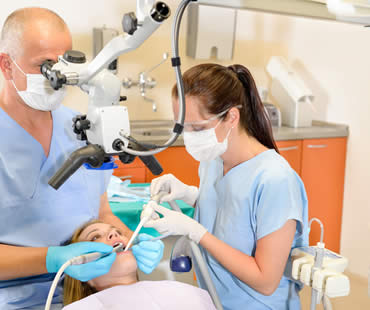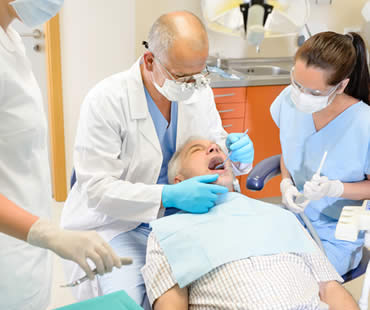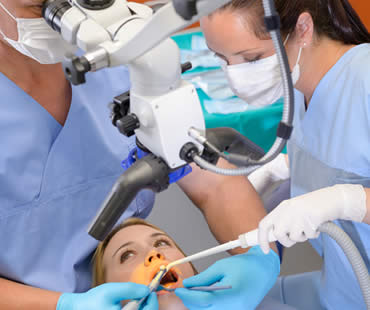
Tooth pain can be one of the most uncomfortable types of pain there is. It can make your whole jaw and head ache, interfere with eating, and cause your teeth to be more sensitive. One common reason for a toothache is your wisdom teeth, which are the molars in the very back of your mouth that develop last. Sometimes they don’t even erupt, but they can still be there under your gums causing trouble. If you experience pain related to wisdom teeth, here are some suggestions.
Make an appointment to see your dentist as soon as possible. This way you can find out for sure if your wisdom teeth are to blame for your pain, and decide the best treatment plan for your situation. A dentist examination, which may include x-rays, is the best way to determine exactly what’s going on with your teeth. You may not even be able to see your wisdom teeth, but they might be growing improperly under your gums. Often, wisdom teeth need to be extracted to avoid continued pain or worsening condition. Luckily, wisdom teeth extraction is a common procedure that your dentist or oral surgeon is very familiar with, and can provide you with great treatment that will end up relieving your pain.
While waiting for your dental appointment, try applying an over-the-counter numbing gel such as Oragel. This may help relieve your pain at least for a short time. Also, taking non-prescription pain medicines should help. Acetaminophen and ibuprofen are both good choices to try, especially to subdue the pain when you want to sleep.
Remember that prevention is often the best way to avoid dental pain. Brush your teeth at least twice a day, and floss every day. See your dentist regularly for checkups, because problems with wisdom teeth can sometimes be spotted before you ever begin to feel any pain associated with them. This allows you to deal with the problem before you have to endure a toothache.
If you live in the Ottawa area contact us today

Most dental professionals recommend having third molars, or wisdom teeth, removed in early adulthood, preferably before they are fully formed and rooted into the jaw. Generally, this means having wisdom teeth extracted between the ages of 17 and 25. Waiting until you are older to have wisdom teeth removed can have considerable risks and complications.
Wisdom teeth that are not removed create the following risks:
- Impaction caused by wisdom teeth that do not have sufficient room to grow, causing pain and potential disease and damage to adjacent teeth.
- Tooth decay from wisdom teeth that are difficult to keep clean.
- Infection caused by bacteria that is harbored in the wisdom tooth eruption site.
- Growth of tumors and cysts caused by severely impacted wisdom teeth.
For patients who need to have wisdom teeth removed later in life, complications can include:
- More complicated removal surgery to eliminate deeply rooted or impacted wisdom teeth that results in longer surgery recovery time.
- Roots that have grown close to the nerve that affects the feeling in the lower lip might be injured in surgery, causing permanent nerve damage.
If you or your young adult have emerging wisdom teeth, schedule a consultation with your dentist to determine if and when they should be removed. While some patients will not need to have their third molars extracted, in most cases, having wisdom teeth removed as they are erupting can help to avoid a host of future problems. When wisdom tooth extraction is performed early, recovery time and risk of complications are drastically reduced for most patients.
We treat patients from Ottawa and the surrounding area

Wisdom teeth are the third set of molars and the last adult teeth to erupt into the mouth. Most people have four wisdom teeth, two on the bottom and two on top. Many people do not have enough room for these molars to emerge completely, causing them to become impacted in the gum. Impacted wisdom teeth are difficult to clean, making them more susceptible to decay and disease. Other dental problems caused by impacted wisdom teeth include pain, damage to surrounding teeth, and bite alignment issues. For these reasons, your dentist may recommend having the impacted teeth removed to prevent future problems.
Surgery to extract an impacted wisdom tooth or set of wisdom teeth is usually an outpatient procedure done in your dentist or oral surgeon’s office. If the tooth or surrounding area are deemed to have an infection prior to the procedure, surgery will be delayed, and your dental professional will likely prescribe antibiotics to help heal the area.
On the day of surgery, local anesthesia will be administered to numb the area where the extracted tooth will be removed. Depending on the severity of your case, your dentist or oral surgeon may also utilize a general anesthetic.
Once the anesthesia has taken effect, an incision will be made to open up the gum and any bone blocking the tooth will be removed. Your dentist or surgeon will then separate the tissue connecting the bone to the tooth and extract the tooth. Some teeth are too large to remove in one piece, in which case your surgeon will cut the tooth into smaller pieces to make it easier to remove. Finally, the incision is closed with stitches and packed with gauze to help alleviate bleeding.
Long-term complications from impacted wisdom tooth surgery are rare. To ensure a successful recovery from this or any oral surgery, be sure to follow all aftercare instructions provided by your dentist or oral surgeon.
We look forward to seeing you in our Ottawa dental office

Wisdom teeth are really just your third molars, located in the very back of your tooth arch and are the last of your adult teeth to erupt. They most commonly erupt between the ages of 17 and 20. Most people have them, but for some people, these third molars simply do not develop. Some patients might have more than one set of wisdom teeth! Only an x-ray can reveal the complete story.
A high number of patients who possess wisdom teeth don’t know they have them because the teeth are impacted, or stuck underneath already erupted teeth, as opposed to erupting normally through the gums. This is when wisdom teeth become problematic.
The patient’s jaw may be too small to allow for the full eruption of the wisdom tooth, leading to it becoming stuck in the jaw, pushing at other teeth, causing pain and shifting of the teeth. The tooth might be able to erupt partially, triggering a flap of gum tissue to develop over the tooth, trapping bacteria and germs which can lead to serious infection.
Sometimes wisdom teeth come in at strange angles, facing sideways or backward, or they develop a serious infection and damage the surrounding teeth. They can also lead to the development of a cyst or cause damage to the jawbone.
If your dentist has told you that you need to have your wisdom teeth out, it’s a good idea to listen and to follow that advice. Removing problematic wisdom teeth can reduce crowding in the mouth, infection in the gums or tooth decay in the wisdom tooth or in the surrounding teeth.
The younger you are when you have your wisdom teeth removed, the easier it is to recover. Ask your dentist to learn more about wisdom teeth and about your particular needs as a patient.
If you need a dentist in Ottawa contact us today

Many people are afraid of getting their wisdom teeth out based on horror stories from the internet or scary tales exaggerated by others. The best way to fight these fears is to learn more about the procedure and what you can truly expect.
The first thing to know is that wisdom teeth extractions are the most common oral surgeries. Most oral surgeons perform an average of one a day, so that experience has provided skill and expertise in the procedure. Also, you will be under some degree of anesthesia. Whether it’s general anesthesia or even just nitrous oxide (laughing gas), you won’t feel anything during the surgery and won’t remember what happened afterwards.
One common fear is the bleeding associated with wisdom teeth extractions. While there is some bleeding from the site after surgery, it is usually easily controlled by following the after-care instructions. You will be told to gently bite on gauze in that area of your mouth, and change it frequently. Propping your head up will help limit the bleeding also.
Swelling is another reason some fear this surgery, but it should be gone in just a few days. You can hold ice packs to the outside of your cheek off and on for the first 24 hours to decrease the swelling.
The recovery process should go smoothly if you follow your oral surgeon’s advice. Have someone drive you to and from the appointment, and eat soft foods at first. Do not use a straw for the first few days, and avoid touching the area with your fingers or tongue. Also, do not smoke for at least the first 24 hours following surgery.
While there are risks associated with any surgery, most wisdom teeth extractions are without complications and recovery is complete in just a few days to a week. The benefits of having the surgery outweigh the risk of ignoring your dentist’s advice to have your wisdom teeth removed.
If you need a dentist in Ottawa contact us today

Your “third molars”, which are the molars in the very back that are the last to erupt, usually start to appear during the late teen years. They may not emerge for everyone, but when they do show up they are often problematic. Most people’s jaws don’t have room for them, and sometimes they are impacted and unable to erupt at all. Here are some common symptoms that you can watch for so you’ll know when your wisdom teeth might be the culprit.
The main thing many people notice is pain as their wisdom teeth develop. These teeth in the far back of your mouth, often two upper and two lower teeth, are very unpredictable. Sometimes they erupt sideways or crooked, causing your other teeth to become misaligned or overcrowded. If your wisdom teeth erupt, you might see them poking through your gums and creating an area of tenderness, inflammation, and redness. It can be painful to eat and brush your teeth. When wisdom teeth pain is very bothersome, dentists usually recommend removing them.
You may be one of the lucky people who don’t experience wisdom tooth pain. However, there are a host of other symptoms associated with these teeth. Some of these include:
- Sore throat
- Fever
- Difficulty swallowing
- Facial swelling
- Nausea
- Pus
- Lymph gland swelling
- Inflamed gums
- Bad breath
- Problems chewing and brushing
- Cysts around impacted wisdom teeth
Any of the above symptoms warrant a visit to your dentist. Even if wisdom teeth aren’t the cause, you should find out what’s behind these problems. If your dentist determines that your wisdom teeth are impacted, you will be advised to have them surgically removed usually by an experienced oral surgeon. Wisdom teeth extraction is a common procedure, so you shouldn’t hesitate to follow your dentist’s recommendation to take care of any problems with these teeth. Once you have recovered from this surgery, you will be glad the symptoms are gone and you no longer have to worry about your wisdom teeth.
Our dental office is located in Ottawa







